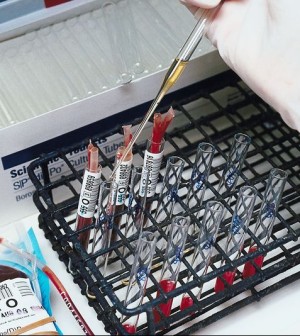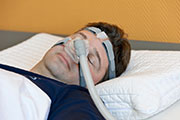- Could Your Grocery Store Meat Be Causing Recurring UTIs?
- Are You Making This Expensive Thermostat Error This Winter?
- Recognizing the Signs of Hypothyroidism
- 10 Strategies to Overcome Insomnia
- Could Artificial Sweeteners Be Aging the Brain Faster?
- Techniques for Soothing Your Nervous System
- Does the Water in Your House Smell Funny? Here’s Why
- Can a Daily Dose of Apple Cider Vinegar Actually Aid Weight Loss?
- 6 Health Beverages That Can Actually Spike Your Blood Sugar
- Treatment Options for Social Anxiety Disorder
Sleep Apnea May Raise Risk of Diabetes, Research Suggests


A study of more than 8,600 people suffering from sleep apnea suggests a possible increased risk for developing diabetes, Canadian researchers report.
They noted that sleep apnea results in less oxygen reaching cells in the body, less sleep and an increased heart rate, all of which are associated with a biological link to diabetes.
“Controlling for known risk factors for diabetes — including age, sex, weight, smoking, other medical problems and income status — patients with severe sleep apnea had a 30 percent higher risk of developing diabetes than those without sleep apnea,” said lead researcher Dr. Tetyana Kendzerska. She’s with the University of Toronto’s Institute of Health Policy, Management and Evaluation.
Obesity, an important risk factor or both diabetes and sleep apnea, was taken into account.
“We controlled for body-mass index [a measure of weight and height that defines obesity], and severe sleep apnea was found to be independently associated with diabetes,” she said.
Kendzerska cautioned, however, that this was an observational study, and cannot prove that sleep apnea causes diabetes. “We are not able to investigate causality, just an association,” she explained.
The report was published online June 6 in the American Journal of Respiratory and Critical Care Medicine.
Shelby Freedman Harris, director of the Behavioral Sleep Medicine Program and the Sleep-Wake Disorders Center at Montefiore Medical Center in New York City, said, “I definitely think that this is an important study highlighting the need for more sleep apnea awareness, screening and treatment.”
“Given the large sample size, it further places emphasis on sleep apnea as a predictor of diabetes, and hopefully with earlier intervention, it can greatly impact the health costs for diabetes management as well as improve the outcomes for many patients,” she said.
For the study, Kendzerska and her colleagues collected data on 8,678 adults who were diagnosed with sleep apnea between 1994 and 2010 and didn’t have diabetes.
The participants were followed through May 2011. During that time 1,017 (11.7 percent) of the patients developed diabetes.
The researchers found that those with the most severe sleep apnea had a 30 percent increased risk of developing diabetes compared to those with the least severe sleep apnea. Patients suffering from mild to moderate sleep apnea had a 23 percent higher risk of developing diabetes.
The study, however, had some limitations, most notably that there was no information about family history of diabetes, the researchers acknowledged.
Sleep apnea is a common problem in which people have one or more pauses in breathing or shallow breaths during sleep.
These pauses can last from a few seconds to minutes and can occur 30 times or more an hour. Typically, normal breathing starts again, sometimes with a loud snort or choking sound.
Sleep apnea results in poor quality of sleep, making sufferers tired during the day, and is the leading cause of daytime sleepiness, according to the U.S. National Heart, Lung, and Blood Institute.
More information
Visit the U.S. National Heart, Lung, and Blood Institute for more on sleep apnea.
Source: HealthDay
Copyright © 2026 HealthDay. All rights reserved.










